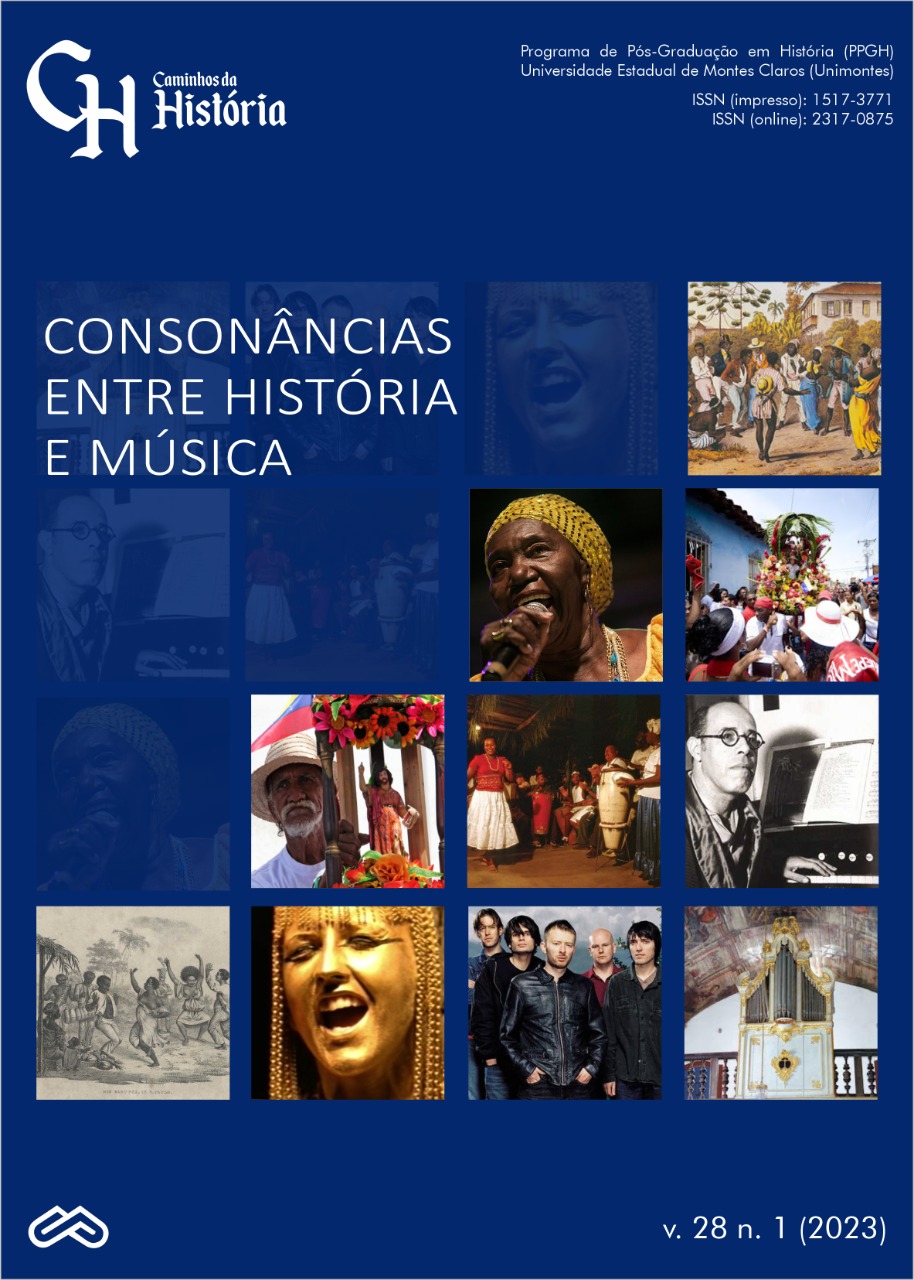Brief notes on the relationship between history, music and technology. A case study in Radiohead's music
Brief notes on the relationship between history, music and technology. A case study in Radiohead's music
DOI:
10.46551/issn.2317-0875v28n1p.81-98Keywords:
Radiohead, Technology, Music, History, Everyday lifeAbstract
This article discusses aspects of the relationship between history, music and technoculture. For that, the song The Tourist by the British band Radiohead will be the soundtrack used to discuss how technological transformations are connected with the forms of artistic production, music creation and music consumption. These themes help us to understand aspects of everyday life and the culture through the changes brought by the diffusion of new technologies at the end of the 20th century. The article is divided into 3 main axes: the first presents a brief history of the relationship between history and music in the first decade of the 2000s and addresses the definition of Urban Popular Music and the concept of soundscape; the second deals with the relationship between technology and music and presents the concept of technoculture, in this axis, it still discusses aspects related to the use of noise as an aesthetic resource in music; the third axis relates to the two previous axes and argues that Urban Popular Music is a privileged object when one intends to study the transformations in sensibilities and daily life from the popularization of technology.
Downloads
References
APROBATO FILHO, Nelson. Kaleidosfone: As novas Camadas Sonoras da Cidade de São Paulo – Fins do Século XIX, Início do Século XX. São Paulo: Edusp, 2008.
ATTALI, Jacques. Noise: The political Economy of Music. University of Minessota Press, 6a Impressão, Minessota, 1999.
COHEN, Eric. Toward a sociology of internacional tourism. Social Research, Spring 1972.
CORREA, Priscila Gomes. “Nada me consola”: cotidiano e cultura nas canções de Caetano Veloso e de Chico Buarque. SalvadorL EDUNEB, 2016.
CORREIA, Luiz Filipe da Silva. Ok Computer e a trilha sonora do fim do milênio: Tecnologia, Sociedade e Cultura (1990-1999). Dissertação apresentada na Faculdade de Filosofia Letras e Ciências Humanas da Universidade de São Paulo para obtenção do título de Mestre em História Social. (2012)
CORREIA, Luiz Filipe da Silva. Modulações entre o analógico e o digital: Apontamentos históricos da inserção do Brasil na era da informação (1977-2000). Tese apresentada à Faculdade de Filosofia, Letras e Ciências Humanas, da Universidade de São Paulo, para obtenção do título de Doutor em História Social (2018).
CORREIA, Luiz Filipe da Silva. "Ok Computer - modulações entre o analógico e o digital”. In: Seminário Popfilia: “Que pop é esse que nos habita?”, I, 2021. Online. Disponível em: https://youtu.be/8vPiyDCLcm0. Acesso em 28 de agosto de 2022.
DEBORD, Guy. A sociedade do espetáculo. Rio de Janeiro: Contraponto, 1997.
DELEUZE, Gilles & GUATTARI, Félix. Kafka: por uma literatura menor. Rio de Janeiro: Imago, 1977.
DIAS, Maria Odila Leite da Silva. Hermenêutica do quotidiano na historiografia contemporânea. Projeto História, n. 17, p. 223-258, 1998.
DOMINGUES, Diana (org). A Arte no século XXI: a humanização das tecnologias. São Paulo: Editora Unesp, 1997.
FOOTMAN, Tim. Radiohead: Welcome to the Machine: Ok Computer and the Death of the Classic Album. New Malden: Chrome Dreams, 2007, p.152.
FISCHERMAN, Diego. Efecto Beethoven. Complejidad y valor en la musica de tradicion popular, BA Paidos, 2005.
FRITH, Simon. Performing Rites: On the Value of Popular Músic. Cambridge: Harvard University Press, 1996
FRITH, Simon. Hacia una estética de la música popular. In Las culturas musicales.
CRUSES, Francisco (org). Lecturas en etnomusicologia. Madrid, Ed Trotta, 2001.
GONZÁLES, Juan Pablo; ROLLE, C. Musicologia Popular en América Latina: Síntesis de sus logros problemas y desafios. Revista Musical Chilena, 195, pp. 38-64, 2001.
GUTTON, Jean-Pierre. Bruit et sons dans notre histoire. Paris: PUF, 2000)
HEGARTY, Paul. Noise/Music: A history. Continuum: Nova Iorque, 2007.
KOSSELLECK, Reinhart. Futuro Passado: Contribuição semântica dos tempos históricos. Rio de Janeiro: Contraponto: Ed. PUC-RJ, 2006.
LYSLOFF, Rene ́ T.A, LESLIE C. GAY, Jr., eds. Music and Technoculture. Middletown, CT: Wesleyan UP, 2003.
MONROE, Alexei. Interrogation Machine. Cambridge, Massachusetts: Mit Press, 2005.
MORAES, José Geraldo Vinci, Modulações e novos ritmos na oficina da História. Revista Galega de Cooperación Cientifica, España, n 11, 2005.
MORAES, José Geraldo Vinci, SALIBA, Elias Thomé (orgs.). História e música no Brasil. São Paulo: Alameda, 2010.
NAPOLITANO, Marcos. História & música – história cultural da música popular. Belo Horizonte: Autêntica, 2002.
PAYTRESS, Marky. Radiohead the Complete guide to their music. London: Omnibus Press, 2005.
Revista de História da USP. n. 157 (2007): DOSSIÊ – "História e Música".
REYNOLDS, Simon. Beijar o Céu. São Paulo: Conrad Editora do Brasil, 2006.
ROSS, Alex. Escuta Só. Do Clássico ao Pop. São Paulo: Companhia das Letras, 2007.
SCHAFER, R. Murray. A afinação do mundo. São Paulo: Unesp, 2001.
SEVCENKO, Nicolau. A corrida para o século XXI: no loop da montanha-russa. São Paulo: Companhia das Letras, 2001.
SEVCENKO, Nicolau. In: ALMEIDA, Miguel de (editor). Livro de ideias. Textos originalmente publicados na Revista E do Sesc São Paulo. São Paulo: Lazuli. 2005.(Coleção E).
THORSBERG, Christian. The future of AI in music is now. Artificial Intelligence was in the music industry long before FN Meka. GRID. 30 de ago de 2022. Disponível em: https://www.grid.news/story/technology/2022/08/30/the-future-of-ai-in-music-is-now-artificial-intelligence-was-in-the-music-industry-long-before-fn-meka/. Acesso em 30 de agosto de 2022.




















